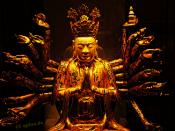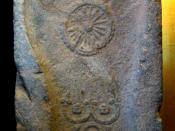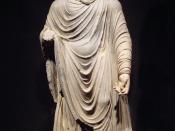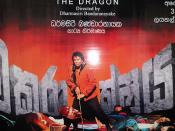To utilize a Buddhist perspective and to quote the Buddha for the purpose of constructing an evaluation of theism seems to me singularly inappropriate, if only for the mere fact that these Buddhist beliefs are taken out of context. Early in "A Buddhist Critique," the author, Gunapala Dharmasiri, states, "it is the context that gives religious statements their meaning" (Kessler 1999, p.116). However, contrary to this professed belief, he continues on to draw from the Buddhist canon examples that are distorted when not viewed in light of other essential Buddhist beliefs.
Thus, Dharmasiri becomes caught up in his own trap by citing Buddhist examples out of context. For example, the author calls upon the fact that, though others believed the world to have been created by a God or Brahma, the Buddha "did not think that such a view could explain anything about the world" (Kessler 1999, p.116). Although this would appear to lead to the fact that the Buddha did not believe in a supreme deity, it does not when viewed in context.
Dharmasiri fails to state that the Buddha neither accepted nor rejected such a belief. In order to more readily understand what the Buddha meant, the context should be provided, for example, in the form of the following parable: The Buddha compares a man obsessed with speculation to a man struck by a poisoned arrow. A man has been struck by a poison arrow and he is dying. When a physician comes to him and offers to remove the arrow, the man says " No, I won't let you take out the arrow, until you tell me the name of the man who shot me, what class he comes from, what his family is, what kind of material the arrow is made of, etc. Such a man will die before the arrow is removed. (Lanka On-line, March 4, 2002) The parable illustrates the Buddhist belief that contemplating the origin of the universe, the idea of a Supreme Creator, and other such theistic subjects, is futile because it does not provide people with the path to salvation. This does not mean that the Buddha forthrightly rejected the belief in a Supreme Being-he merely did not see it as functional.
Apart from the above-stated example, others are to be found in the text that depart from the primary Buddhist belief that the origins do not matter, rather it is the outcome that is significant. Thus, in utilizing the Buddhist dogma to argue theism, Dharmasiri is contradicting himself by taking the former ideas out of context and by forgetting that "original" Buddhism can be explained as an eight-step plan to attaining salvation with the Buddha as a physician figure and with no thought to the past or to origins, be it of the world or of God.
Works Cited Dharmasiri, Gunapala. "A Buddhist Critique." In Philosophy of Religion. Gary E. Kessler, ed. Belmont, CA: Wadsworth Publishing Company. Pp. 115-122.
Lanka-Online. The Man Struck by the 'Poison Arrow'. Lanka On-line. March 4, 2002. http://www.lanka.com/dhamma/dhamma/man_struck_by_the.htm





